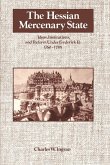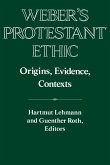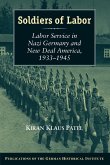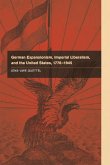Explores the discourse on war in Germany and the United States between 1871 and 1914.
These essays explore the discourse on war in Germany and the United States between 1871 and 1914 - in the era bounded by the mid-century wars in Europe and North America and the First World War. The concept of 'total war', which was prefigured in aspects of the earlier conflicts and realized in 1914, provides the analytical focus. The essays reveal vigorous discussions of warfare in several forums - among soldiers, statesmen, women's groups and educators - on both sides of the Atlantic. Predictions of long, cataclysmic wars were not uncommon in these discussions, while the involvement of German and American soldiers in colonial warfare suggested that future combat would not spare civilians. Despite these 'anticipations of total war', virtually no one drew the practical implications in planning for war in the early twentieth century.
Review quote:
"...this is a highly important collection of essays providing insights into the nineteenth century origins of the twentieth century standard of extreme, all-consuming, horrific warfare known as 'total war.'"
The Journal of Military History
"...immense volume...The comparative format of this volume proves valuable."
The Journal of American History
"This book will find its greatest audience among academics. Readers will find the essays well supported with a wide range of sources, as might be expected in a work that is itself somewhat broad."
H-Net Reviews
"The project's intellectual and financial sponsors merit corresponding praise for expanding the scope of the remaining conferences to address total war in European and global contexts."
The Journal of Modern History
"...these essays make important and original contributions to a historiography on the Great War that continues to evolve in exciting and promising new directions." Technology and Culture
Table of contents:
Introduction Roger Chickering and Stig Förster; Part I. Germany, The United States and Total War: 1. Total war: the use and abuse of a concept Roger Chickering; 2. Different path to war: a comparative study of militarism and imperialism in the United States and Imperial Germany, 1871-1914 Irmgard Steinisch; Part II. War and Society: 3. The political economy of warfare in America, 1865-1914 Paul A. C. Kiostinen; 4. Hugo Stinnes and the prospect of war before 1914 Gerald D. Feldman; 5. War preparations and ethnic and racial relations in the United States Bruce White; 6. Religion and war in Imperial Germany Gangolf Hübinger; 7. Socializing American youth to be citizen-soldiers David I. MacLeod; 8. Preparing German youth for war Derek S. Linton; 9. Heroes and would-be heroes: veterans' and reservists' associations in Imperial Germany Thomas Rohkrämer; 10. Mobilizing philanthropy in the service of war: the female rituals of care in the New Germany, 1871-1914 Jean H. Quataert; Part III. Memory and Anticipation: War and Culture: 11. The American debate over modern war, 1871-1914 John Whiteclay Chambers II; 12. Whose war? Whose nation? Tensions in the memory of the Franco-German War of 1870-1871 Alfred Kelly; 13. War preparations and national identity in Imperial Germany Volker R. Berghahn; 14. Military imagination in the United States, 1815-1917 David F. Trask; 15. Dreams and nightmares: German military leadership and the images of future warfare, 1871-1914 Stig Förster; 16. 'A calamity to civilization': Theodore Roosevelt and the danger of war in Europe Raimund Lammersdorf; Part IV. The Experience of War: 17. Total war on the American Indian Frontier Robert M. Utley; 18. 'The fellows can just starve': on wars of 'pacification' in the African colonies of Imperial Germany and the concept of 'total war' Trutz von Trotha; 19. Was the Philippine-American war a 'total war'? Glenn Anthony May; 20. An army on vacation? The German war in China, 1900-1901 Sabine Dabringhaus; Index.
Hinweis: Dieser Artikel kann nur an eine deutsche Lieferadresse ausgeliefert werden.
These essays explore the discourse on war in Germany and the United States between 1871 and 1914 - in the era bounded by the mid-century wars in Europe and North America and the First World War. The concept of 'total war', which was prefigured in aspects of the earlier conflicts and realized in 1914, provides the analytical focus. The essays reveal vigorous discussions of warfare in several forums - among soldiers, statesmen, women's groups and educators - on both sides of the Atlantic. Predictions of long, cataclysmic wars were not uncommon in these discussions, while the involvement of German and American soldiers in colonial warfare suggested that future combat would not spare civilians. Despite these 'anticipations of total war', virtually no one drew the practical implications in planning for war in the early twentieth century.
Review quote:
"...this is a highly important collection of essays providing insights into the nineteenth century origins of the twentieth century standard of extreme, all-consuming, horrific warfare known as 'total war.'"
The Journal of Military History
"...immense volume...The comparative format of this volume proves valuable."
The Journal of American History
"This book will find its greatest audience among academics. Readers will find the essays well supported with a wide range of sources, as might be expected in a work that is itself somewhat broad."
H-Net Reviews
"The project's intellectual and financial sponsors merit corresponding praise for expanding the scope of the remaining conferences to address total war in European and global contexts."
The Journal of Modern History
"...these essays make important and original contributions to a historiography on the Great War that continues to evolve in exciting and promising new directions." Technology and Culture
Table of contents:
Introduction Roger Chickering and Stig Förster; Part I. Germany, The United States and Total War: 1. Total war: the use and abuse of a concept Roger Chickering; 2. Different path to war: a comparative study of militarism and imperialism in the United States and Imperial Germany, 1871-1914 Irmgard Steinisch; Part II. War and Society: 3. The political economy of warfare in America, 1865-1914 Paul A. C. Kiostinen; 4. Hugo Stinnes and the prospect of war before 1914 Gerald D. Feldman; 5. War preparations and ethnic and racial relations in the United States Bruce White; 6. Religion and war in Imperial Germany Gangolf Hübinger; 7. Socializing American youth to be citizen-soldiers David I. MacLeod; 8. Preparing German youth for war Derek S. Linton; 9. Heroes and would-be heroes: veterans' and reservists' associations in Imperial Germany Thomas Rohkrämer; 10. Mobilizing philanthropy in the service of war: the female rituals of care in the New Germany, 1871-1914 Jean H. Quataert; Part III. Memory and Anticipation: War and Culture: 11. The American debate over modern war, 1871-1914 John Whiteclay Chambers II; 12. Whose war? Whose nation? Tensions in the memory of the Franco-German War of 1870-1871 Alfred Kelly; 13. War preparations and national identity in Imperial Germany Volker R. Berghahn; 14. Military imagination in the United States, 1815-1917 David F. Trask; 15. Dreams and nightmares: German military leadership and the images of future warfare, 1871-1914 Stig Förster; 16. 'A calamity to civilization': Theodore Roosevelt and the danger of war in Europe Raimund Lammersdorf; Part IV. The Experience of War: 17. Total war on the American Indian Frontier Robert M. Utley; 18. 'The fellows can just starve': on wars of 'pacification' in the African colonies of Imperial Germany and the concept of 'total war' Trutz von Trotha; 19. Was the Philippine-American war a 'total war'? Glenn Anthony May; 20. An army on vacation? The German war in China, 1900-1901 Sabine Dabringhaus; Index.
Hinweis: Dieser Artikel kann nur an eine deutsche Lieferadresse ausgeliefert werden.








